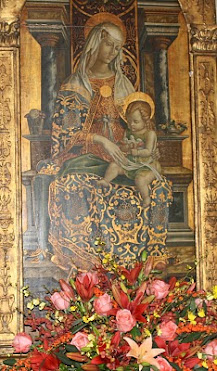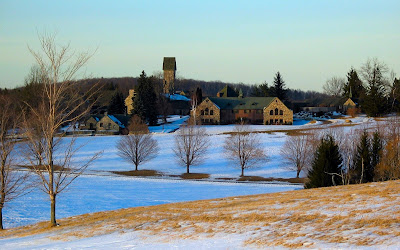We can imagine a typical Sabbath in the synagogue at Capernaum- people gathering, greeting one another; small groups of men in conversation, perhaps a few women; younger men entering and giving each other a nod. And then they all notice the possessed man coming in. Weariness, some irritation. “Why does his family even let him come here?” The younger men are grinning at one another, a couple of winks, as they recall a recent Sabbath when this guy blurted out an embarrassing truth about one of the elders. They loved that. This ought to be good, they think. What he will come out with today? Then Jesus enters. Some recognize him too. He sits with them, speaks a word, and teaches them simply, clearly, lovingly- not from on high but as friend and brother. For many, this is a moment of astonishment as they hear his word of truth and feel their hearts broken open. They close their eyes, their heads lowered. Then it happens, you-know-who starts up: “What have you to do with us, Jesus of Nazareth? Have you come to destroy us? I know who you are- the Holy One of God.” Now there’s even more astonishment. This crazy man has uttered blasphemy on the Sabbath; even though, truth be told, some of them have been thinking the very same thing as Jesus spoke. “Could he be the One?”
Imagine the gall of that demon shouting out Jesus’ name- for speaking a name is to have power over the other. He blurts out Jesus’ name, as if to pick a fight with him. But Jesus sees into the heart. He knows it’s the demon speaking, not the man. And Jesus does not kowtow or spar with demons. He doesn’t do dialog with demons. He simply says, “Quiet.” “Stop. Enough. Come out of him; leave him alone. Get out of here. Be gone. Demons do not know me. The poor, the sick, the lost, little ones, they know who I am. They may call upon my name for I have come for them.” This most tender and most efficacious compassion of Jesus. He speaks and the evil spirit knows he’s done for. And as once Jesus spoke to the turbulent Sea of Galilee, to its crashing waves and the raging winds above, “Quiet. Be still,” so now he rebukes the demon who has taken this man’s voice away. “Be still and know that I am God.” Jesus gives him back his voice, his freedom, gives him back to himself, to his family, to his community; he no longer needs to be avoided, isolated. There’s even more astonishment now. And thus, Jesus establishes himself at the beginning of his ministry, at the beginning of this Gospel of Mark, as opposed to all oppression and misery; (See Sacra Pagina: Mark) his power expressed not in dominance but in humble loving service. He sets free, he unburdens. Satan’s power over the world has come to an end; the reign of God in Christ has definitively broken into human history. ( See Margaret Page)
A man once held fast by an unclean spirit is freed. But we do not hear from him in this Gospel, we’ve only heard from the loud-mouthed spirit. It is his voice that Jesus longs to hear. And so he quiets the demon to encounter the one whom he loves. Aren’t you fascinated, longing with Jesus to know this man? Who was he? One can only wonder what took place after the convulsion and the loud cry there on the floor of the synagogue. What was in his heart? Did he embrace Jesus once he was freed? What did freedom and fluency feel like? Did he praise God in a loud voice? Did he bow down and worship Jesus as Lord, like so many others who were cured? Did he become his follower? How did this freedom change him? Could he recognize the evil spirit’s voice from then on, detect the unclean spirit’s trickery in a heartbeat and say for himself, “Get out of here?”
“Quiet!” - a word given to us to be repeated against all the deceptive words that the Evil One would pour into our ears. We have power in Christ to dismiss them. Do you believe it? Does this sound spooky, occult, or superstitious? No, just very real. It is simply the reality of our life in Christ. For if we desire God, deeply desire Christ Jesus, desire to belong to him, to choose his way, then simple logic will tell us that the unclean spirit, the Evil One will want the opposite, and want to confuse us with many useless words. Jesus wants our freedom, our quiet. And we have the power in Christ Jesus to choose and dismiss the unclean spirit; a power given to us at our baptism when faith in Him was entrusted to us when the power of his quiet was entrusted to us. But it’s a power we need to keep choosing, that’s why we renew our baptismal promises each year at the Easter Vigil. “Do you refuse to be mastered by sin? Do you reject the glamour of evil? Do you reject Satan?” “Yes, yes, yes.”
Don’t we long for the power of his quiet
over our weakness, our inner babble? When there’s too much noise, I want to
know the power of Jesus over me, for his grace is sufficient, his power made
perfect in my weakness. I need the
power of his quiet resting on me. Not a quiet that is hollow or sad; not a dull
sleepy quiet. But a quiet for… a quiet for listening, a quiet that even within
these walls allows us to hear the cry of the poor. Quiet for love, quiet for him,
quiet in him, for he is my Quiet, my rest, safe haven. Quiet to wait, quiet to
listen for a voice of hope and peace and freedom and mercy, a quiet that is attentiveness,
emptiness for him, quiet to receive, to be filled with his body and blood.
Photograph by Brother Brian. Meditation by one of the monks.















